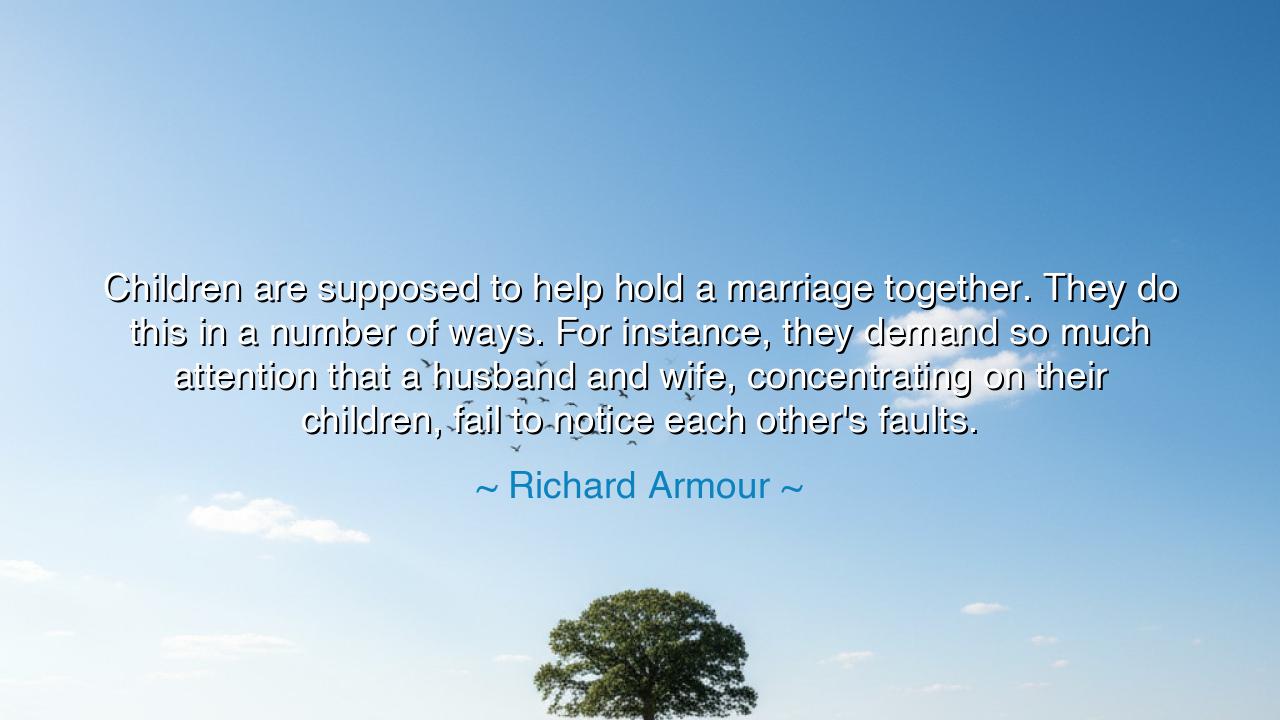
Children are supposed to help hold a marriage together. They do
Children are supposed to help hold a marriage together. They do this in a number of ways. For instance, they demand so much attention that a husband and wife, concentrating on their children, fail to notice each other's faults.






In the words of Richard Armour, the humorist and philosopher of everyday life, we find a truth wrapped in laughter: “Children are supposed to help hold a marriage together. They do this in a number of ways. For instance, they demand so much attention that a husband and wife, concentrating on their children, fail to notice each other’s faults.” Beneath the veil of wit lies a reflection as old as humanity itself. Armour, with his lighthearted wisdom, reveals that the family, though often tested by chaos, finds its strength not in perfection, but in shared devotion. In this saying, he shows that the bond between man and woman is not sustained by flawless harmony, but by the distraction of love—the turning outward toward something greater than the self.
To understand the meaning of Armour’s words, one must look beyond the humor and see the profound irony he unveils. Children, though demanding and unruly, are not merely the result of love—they are the glue that holds it fast. When two people bring life into the world, they no longer gaze endlessly at each other, searching for flaws or faults; their eyes turn toward the fragile miracle between them. In this shared focus, their differences fade into the background, softened by purpose. Armour’s jest conceals a truth known to every parent: that through the trials and tribulations of raising children, a husband and wife often rediscover unity—not in leisure, but in labor; not in romance, but in responsibility.
The origin of this insight stretches far into the ancient past. In every culture, the birth of a child has been seen as both a test and a blessing. In the old days, when families lived in simple dwellings and life depended on cooperation, the raising of children required the combined strength of both parents. The work was hard, the nights long, but the reward was mutual survival. In that shared striving, faults mattered little, for the greater task of nurturing life overshadowed all else. Even today, in a world of comfort and distraction, this truth endures: when parents unite in care, they bind their hearts with threads of shared endurance.
History itself gives us examples of this sacred bond. Consider John and Abigail Adams, whose marriage endured the storms of revolution and the demands of public service. Separated by oceans, burdened by the raising of children and the building of a nation, their letters still shine with devotion. They found in their family both refuge and reason—a purpose beyond themselves. Their partnership was not built upon flawless affection, but upon shared sacrifice, the same force that Armour alludes to in jest. The children they raised and the cause they served together became the fire that tempered, rather than consumed, their love.
Armour’s humor also hides a gentle warning: without the distractions of care and responsibility, human beings turn their gaze inward—and often, destructively so. Left idle, the mind magnifies faults and the heart breeds dissatisfaction. But where there is work, where there are children to tend and dreams to build, the eyes are drawn outward, toward meaning. Thus, children, in their innocence, teach adults the virtue of selflessness. They demand not perfection, but patience; not judgment, but mercy. And in learning to give these things to their offspring, a husband and wife unwittingly give them to each other.
There is a paradox here: that what most strains a marriage may also be what most strengthens it. The sleepless nights, the quarrels, the noise—these are not signs of decay, but of life. A family without friction is like a sea without wind: calm, but stagnant. The effort it takes to raise children, to build a home, and to nurture love through exhaustion and imperfection is the crucible in which true companionship is forged. Armour, in his playful wisdom, reminds us that the chaos of family life is not an obstacle to love, but its proving ground.
The lesson of this quote, then, is both humbling and hopeful. If you seek perfection in your partner, you will find only disappointment. But if you seek purpose—if together you turn your hearts toward something greater, whether it be children, service, or a shared calling—your union will deepen beyond the reach of fault. The secret of lasting love is not endless admiration, but shared attention—the act of forgetting one’s grievances in the pursuit of something sacred and enduring.
Therefore, let us remember the wisdom hidden in Armour’s laughter: that love, when turned outward, grows stronger; that the noise of children is the music of survival; that the demands of family, though heavy, keep hearts humble and souls awake. For in caring for the young, we forget ourselves—and in forgetting ourselves, we find each other again. Thus, the humble truth resounds through the ages: children do not perfect a marriage—they protect it, not by easing its burdens, but by filling it with meaning.






AAdministratorAdministrator
Welcome, honored guests. Please leave a comment, we will respond soon